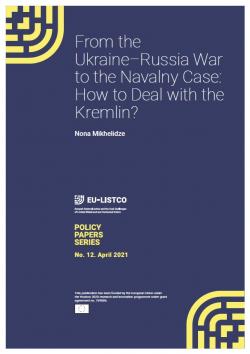From the Ukraine–Russia War to the Navalny Case: How to Deal with the Kremlin?

Seven years after the annexation of Crimea and amid an ongoing war in Ukraine, Russia has tried to move towards military escalation in the Donbass region making clear that the status quo emerged in 2014 as a “new normal” cannot last. The Minsk II Agreement negotiated between Ukraine, Russia, France and Germany in the framework of the Normandy Format in February 2015 remains unimplemented despite numerous rounds of mediation. Western economic sanctions against Moscow succeeded in limiting the Kremlin’s military advance beyond Donbass and deterred it from making further territorial gains. However, these measures failed to impact on Russian decision-making regarding resolution of the conflict. Influencing Russia’s foreign policy is not an easy task, as the country’s conduct of international relations is shaped by domestic factors and the authoritarian nature of its governance. Still, the West needs a strategy in response to the international and domestic wrongdoings already committed by the Kremlin and as a preventative measure to deter Moscow’s future aggression. In order to face the Russian challenge, the West should first design clear rules for its own foreign-policy behaviour based on the primacy of human rights and democracy and then define how to defend universal values abroad, including in Russia. Only after, it could structure a transatlantic strategy along the following lines: active United States–European Union involvement in the Normandy Format aimed at the fulfilment of the Minsk II Agreement, strengthening Ukraine’s resilience in developing democracy and its military and energy sectors and finally improving sanctions mechanisms against the Kremlin.
-
Details
Barcelona, CIDOB, April 2021, 11 p. (EU-LISTCO Policy Paper Series, No. 12)


